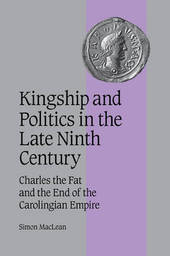
|
Kingship and Politics in the Late Ninth Century: Charles the Fat and the End of the Carolingian Empire
Paperback / softback
Main Details
| Title |
Kingship and Politics in the Late Ninth Century: Charles the Fat and the End of the Carolingian Empire
|
| Authors and Contributors |
By (author) Simon MacLean
|
| Series | Cambridge Studies in Medieval Life and Thought: Fourth Series |
|---|
| Physical Properties |
| Format:Paperback / softback | | Pages:288 | | Dimensions(mm): Height 228,Width 152 |
|
| Category/Genre | World history - BCE to c 500 CE |
|---|
| ISBN/Barcode |
9780521044455
|
| Classifications | Dewey:944.014092 |
|---|
| Audience | | Professional & Vocational | |
|---|
| Illustrations |
8 Maps
|
|
Publishing Details |
| Publisher |
Cambridge University Press
|
| Imprint |
Cambridge University Press
|
| Publication Date |
29 November 2007 |
| Publication Country |
United Kingdom
|
Description
This is a major study of the collapse of the pan-European Carolingian empire and the reign of its last ruler, Charles III 'the Fat' (876-888). The later decades of the empire are conventionally seen as a dismal period of decline and fall, scarred by internal feuding, unfettered aristocratic ambition and Viking onslaught. This book offers an alternative interpretation, arguing that previous generations of historians misunderstood the nature and causes of the end of the empire, and neglected many of the relatively numerous sources for this period. Topics covered include the significance of aristocratic power; political structures; the possibilities and limits of kingship; developments in royal ideology; the struggle with the Vikings and the nature of regional political identities. In proposing these explanations for the empire's disintegration, the book has broader implications for our understanding of this formative period of European history more generally.
Author Biography
Simon MacLean is Lecturer in History at the University of St Andrews, Scotland.
Reviews'... MacLean provides an important rereading of the reign of the last Carolingian emperor which has far reaching consequences for historians of post-Carolingian Europe ... his arguments have important implications for the prevailing interpretations of the tenth century ...' History '... this is an excellent book and makes many important contributions to a period that deserves to be better known and understood.' English Historical Review
|